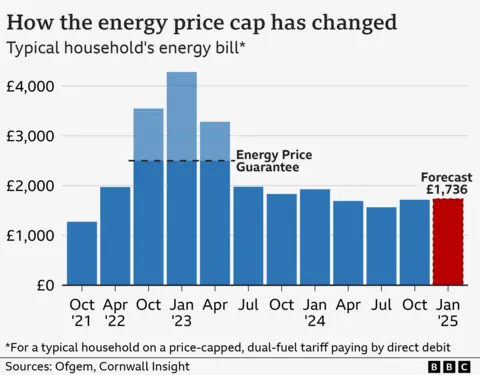High domestic energy prices are likely to be "the new normal" with a slight rise predicted for January, according to consultancy Cornwall Insight.
A home using a typical amount of gas and electricity will pay £1,736 annually from the new year, according to the forecaster.
That would be a rise of £19 a year, a 1% increase, compared with the current typical annual bill of £1,717, it said, with little chance of a big drop in the foreseeable future.
Energy regulator Ofgem will announce the next official quarterly price cap on Friday, with some charities concerned about how less well-off households will cope during the colder months.
The energy cap limits the maximum price that can be charged for each unit of gas and electricity, rather than the total bill.
This means people in larger properties will tend to pay more overall owing to higher energy usage, and those in smaller properties tend to pay less.
The energy watchdog Ofgem's price cap affects about 27 million households in England, Wales and Scotland. Different rules apply in Northern Ireland.
Dr Craig Lowrey, principal consultant at Cornwall Insight, said that while bills will remain "largely unchanged" from October, the news that prices will not drop after rises were seen in the autumn will still be "disappointing" for many.
"What we've been looking at were prices well above the historic norms," he told the BBC's Today programme.

He added that there "doesn't seem to be any sign of a return to pre-energy crisis levels". Prices jumped in 2022 when the conflict between Russia and Ukraine broke out.
The consultancy, which is held in high regard for its accurate predictions, also expects that prices will remain higher due to geopolitical tensions, bad weather and maintenance taking place on Norwegian gas infrastructure.
The market is still "very sensitive" to global events, it said.
Peter Smith, director of policy at the National Energy Action charity, said that many people were already "rationing their energy use" or building up debt to try to keep warm.
"With increased wholesale prices in the last few months, there won't be any let up in the unaffordable cost of energy," he said.
Further ahead, Cornwall Insight anticipates the energy price cap will drop slightly in April 2025 and again in October 2025.
It suggested that it may still be important for the government to consider "ways to protect the vulnerable" from higher energy bills, such as social tariffs.
The new Labour government has faced criticism for its decision to withdraw the winter fuel payment for millions of pensioners.
At Chancellor Rachel Reeves' first Budget, it was confirmed that future payments would only be made to those getting pension credit or other means-tested help.
The government has said the move was necessary in order to address what it has called a financial "black hole" it inherited from the Conservatives.
But other politicians and unions have warned that older or vulnerable people with disabilities could risk their health by cutting back on heating their homes as a result.
In Scotland, a couple has been given permission to proceed with their own legal challenge against both the UK and Scottish governments over the changes to the benefit.

How to keep energy use - and bills - down
- If your hot water is too hot to wash your hands in, then your setting is too high so turn the boiler down
- Manage your draughts, such as putting a black bag with scrunched up paper up an unused chimney, or limit other draughts around the home
- Limit time in the shower to four minutes. The charity WaterAid has compiled a playlist of four-minute songs to keep you to time

Sign up for our Politics Essential newsletter to read top political analysis, gain insight from across the UK and stay up to speed with the big moments. It’ll be delivered straight to your inbox every weekday.

.jfif)
Post a Comment